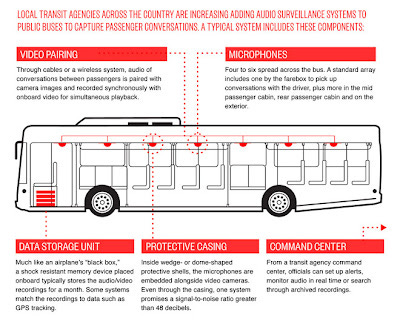Cities are installing audio surveillance systems on public buses across the country.

Government officials are quietly installing sophisticated audio surveillance systems on public buses across the country to eavesdrop on passengers, according to documents obtained by The Daily. Plans to implement the technology are under way in cities from San Francisco to Hartford, Conn., and Eugene, Ore., to Columbus, Ohio.
Linked to video cameras already in wide use, the microphones will offer a formidable new tool for security and law enforcement. With the new systems, experts say, transit officials can effectively send an invisible police officer to transcribe the individual conversations of every passenger riding on a public bus.
But the deployment of the technology on buses raises urgent questions about the boundaries of legally protected privacy in public spaces, experts say, as transit officials — and perhaps law enforcement agencies given access to the systems — seem positioned to monitor audio communications without search warrants or court supervision.
In San Francisco, for example, transit officials recently approved a $5.9 million contract to install a new audio-enabled surveillance system on 357 buses and trolley cars over four years, with an option for 613 more vehicles. The contract, signed in July, specifies both modern buses and historic trolley cars.
A spokesman for the San Francisco Municipal Transportation Agency, Paul Rose, declined to comment on the surveillance program. But procurement documents explain the agency’s rationale.
“The purpose of this project is to replace the existing video surveillance systems in SFMTA’s fleet of revenue vehicles with a reliable and technologically advanced system to increase passenger safety and improve reliability and maintainability of the system,” officials wrote in contract documents.
In San Francisco, the Department of Homeland Security is funding the entire cost with a grant. Elsewhere, the federal government is also providing some financial support. Officials in Concord, N.C., for example, used part of a $1.2 million economic stimulus grant to install a combined audio and video surveillance system on public transit vehicles, records show.
“Given the resolution claims, it would be trivial to couple this system to something like facial or auditory recognition systems to allow identification of travelers,” said Ashkan Soltani, an independent security consultant asked by The Daily to review the specs of an audio surveillance system marketed to transit agencies. “This technology is sadly indicative of a trend in increased surveillance by commercial and law enforcement entities, under the guise of improved safety.”
Numerous private companies are seeking to gain a foothold in the market for customized audio systems in public buses. Safety Vision, a company based in Houston, offers the RoadRecorder 7000, the hub of a high-definition video system built to store 128 gigabytes of data collected from 12 cameras, each with its own embedded microphone. DTI Group, an Australian company scheduled to exhibit its wares at the 2014 American Public Transit Association Expo, promotes its specialty as the ability to merge audio recordings with video and tracking data.
“An audio device on an MTA vehicle will pick up all passenger conversations, whether uttered softly or shouted,” Melissa Goemann, legislative director of the state chapter of the ACLU, said in written testimony at a committee hearing in March. http://www.thedaily.com/article/2012/12/10/121012-news-bus-audio-surveillance/
Public buses across country quietly adding microphones to record passengers.
Transit authorities in cities across the country are quietly installing microphone-enabled surveillance systems on public buses that would give them the ability to record and store private conversations, according to documents obtained by a news outlet.
The systems are being installed in San Francisco, Baltimore, and other cities with funding from the Department of Homeland Security.
The use of the equipment raises serious questions about eavesdropping without a warrant, particularly since recordings of passengers could be obtained and used by law enforcement agencies.
It also raises questions about security, since the IP audio-video systems can be accessed remotely via a built-in web server (pdf.), and can be combined with GPS data to track the movement of buses and passengers throughout the city.
According to the product pamphlet for the RoadRecorder 7000 system made by SafetyVision (pdf.), “Remote connectivity to the RoadRecorder 7000 NVR can be established via the Gigabit Ethernet port or the built-in 3G modem. A robust software ecosystem including LiveTrax vehicle tracking and video streaming service combined with SafetyNet central management system allows authorized users to check health status, create custom alerts, track vehicles, automate event downloads and much more.”
The systems use cables or WiFi to pair audio conversations with camera images in order to produce synchronous recordings. Audio and video can be monitored in real-time, but are also stored onboard in blackbox-like devices, generally for 30 days, for later retrieval. Four to six cameras with mics are generally installed throughout a bus, including one near the driver and one on the exterior of the bus.
Cities that have installed the systems or have taken steps to procure them include San Francisco, California; Eugene, Oregon; Traverse City, Michigan; Columbus, Ohio; Baltimore Maryland; Hartford, Connecticut; and Athens, Georgia.
San Francisco transit authorities recently approved a $5.9 million contract to install an audio surveillance system on 357 buses and vintage trolley cars, paid for in full with a grant from DHS. The contract includes the option to expand the equipment to an additional 600 vehicles.
Concord, New Hampshire also used part of a $1.2 million economic stimulus grant to install its new video/audio surveillance system on buses.
http://www.wired.com/threatlevel/2012/12/public-bus-audio-surveillance/
For more about this check out my article from 12/4/12:
"Surveillance cameras which record audio are being put on buses & trains."
http://massprivatei.blogspot.com/2012/12/surveillance-cameras-which-record-audio.html


